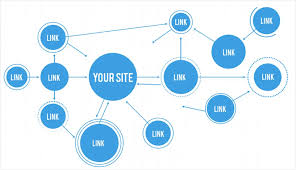The Importance of Outbound Links in SEO
Search Engine Optimization (SEO) is a crucial aspect of any website’s success in the digital world. While many focus on internal linking and optimizing content, the role of outbound links should not be overlooked.
Outbound links are hyperlinks that point from your website to external websites. When used strategically, outbound links can have a positive impact on your site’s SEO performance. Here are some reasons why outbound links matter:
- Credibility and Authority: By linking to reputable and authoritative sources, you signal to search engines that your content is well-researched and trustworthy. This can help improve your site’s credibility and authority in the eyes of both users and search engines.
- Relevance: Outbound links to relevant and related websites can provide additional context for your content. They show search engines that you are part of a larger network of information on a particular topic, which can boost your site’s relevancy for specific keywords.
- User Experience: Outbound links can enhance the user experience by offering additional resources and information that complement your content. This can keep visitors engaged on your site longer, reducing bounce rates and improving overall user satisfaction.
- Networking and Relationship Building: Linking to other websites can help you build relationships with other webmasters and influencers in your industry. This networking can lead to potential backlinks from those sites, further boosting your SEO efforts.
- Diverse Link Profile: Search engines value websites with a diverse link profile that includes both inbound and outbound links. Having a healthy mix of both types of links signals to search engines that your site is part of a larger ecosystem of valuable online resources.
In conclusion, incorporating outbound links into your SEO strategy is essential for enhancing your website’s credibility, relevance, user experience, networking opportunities, and overall link profile. By carefully selecting and using outbound links in your content, you can improve your site’s SEO performance and establish it as a valuable resource within your industry.
Understanding Outbound Links in SEO: Key FAQs Answered
- What is the difference between backlink and outbound link?
- What is an outbound link in SEO?
- How many outbound links is good for SEO?
- Are outgoing links good for SEO?
- What is inbound and outbound in SEO?
- What is outbound link in digital marketing?
What is the difference between backlink and outbound link?
When discussing SEO strategies, it is important to understand the distinction between backlinks and outbound links. Backlinks, also known as inbound links, are hyperlinks on external websites that direct traffic to your website. They play a crucial role in improving your site’s authority and search engine rankings. On the other hand, outbound links are hyperlinks on your website that point to external websites. These links help provide additional context, credibility, and relevance to your content while also contributing to a diverse link profile. While backlinks focus on incoming traffic to your site, outbound links focus on directing traffic from your site to external sources, both of which are essential components of a comprehensive SEO strategy.
What is an outbound link in SEO?
An outbound link in SEO refers to a hyperlink on a webpage that directs users to another website or domain. From an SEO perspective, outbound links play a significant role in establishing the credibility and relevance of a website. By linking to authoritative and relevant external sources, website owners signal to search engines that their content is well-researched and trustworthy. Outbound links not only provide additional context for the content but also contribute to a diverse link profile, which is essential for improving the site’s overall SEO performance. When used strategically, outbound links can enhance user experience, build relationships with other websites, and demonstrate the website’s connection to a broader network of valuable online resources.
How many outbound links is good for SEO?
The optimal number of outbound links for SEO can vary depending on the specific context and goals of a website. While there is no definitive answer to how many outbound links are ideal for SEO, it is generally recommended to focus on quality over quantity. It is important to ensure that outbound links are relevant, authoritative, and add value to the user experience. By strategically incorporating outbound links that enhance the credibility and context of your content, you can contribute positively to your site’s SEO performance. Monitoring the impact of outbound links on user engagement and search engine rankings can help determine the most effective linking strategy for your website.
Are outgoing links good for SEO?
Outbound links, also known as outgoing links, play a significant role in SEO. While some may question the impact of linking to external websites on their own site’s search engine optimization, outbound links are actually beneficial for SEO when used strategically. By linking to reputable and relevant sources, websites can enhance their credibility, authority, and relevance in the eyes of search engines. Outgoing links also contribute to a more comprehensive user experience by providing additional context and resources to visitors. Overall, incorporating outbound links into a website’s content can positively influence its SEO performance and contribute to a well-rounded linking strategy.
What is inbound and outbound in SEO?
In the realm of SEO, inbound and outbound links play crucial roles in determining a website’s visibility and authority. Inbound links, also known as backlinks, are hyperlinks from external websites that direct traffic to your site. They are essential for building credibility and improving search engine rankings. On the other hand, outbound links are hyperlinks from your website to external sites. These links contribute to establishing relevance, credibility, and user experience on your site by providing additional context and resources for visitors. Both inbound and outbound links are integral components of a well-rounded SEO strategy aimed at enhancing a website’s online presence and overall performance in search engine results pages.
What is outbound link in digital marketing?
In the realm of digital marketing, an outbound link refers to a hyperlink on a website that directs visitors to an external webpage or domain. These links are strategically placed within content to provide additional information, resources, or references related to the topic at hand. Outbound links play a crucial role in SEO by establishing connections between websites and signaling credibility and authority to search engines. By incorporating outbound links effectively into their digital marketing strategies, businesses can enhance their online presence, improve user experience, and strengthen their overall SEO performance.




